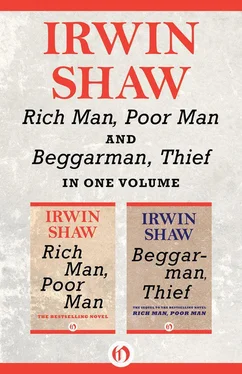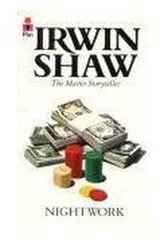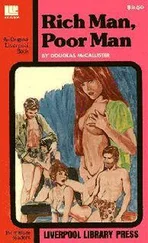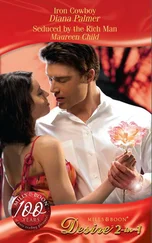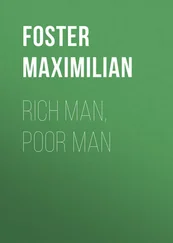After the final fade-out, the applause was loud and sustained, greater than that at any of the other movies Billy had heard about since the festival opened. Then people began turning around and applauding, and he saw that they were applauding his mother, who was standing, smiling tremulously, at the railing of the balcony. Billy, near tears himself, clapped with the heartiest of the people around him. As he filed out of the hall, moved by his mother’s accomplishment, he wondered what had driven him to be such a bastard with his mother for all those years.
Outside, on the Croisette, he saw a cluster of young people getting autographs from a man who was standing with his back toward him. Whoever it was, he was almost obscured by a tall, bulky boy in blue jeans. Curiously, Billy went toward the group. Then he stopped. The man who was autographing programs and notebooks and scraps of paper was Wesley. Billy grinned. The ham, he thought, I should have known he couldn’t resist seeing himself. He pushed his way, as politely as possible, through the little crowd around Wesley, who was bending over, signing a notebook held out to him by a short girl in a gypsy skirt. “Mr. Jordan,” Billy said, lisping in a high, feminine voice, “will you sign my program for me? I think you’re just wonderful.”
Wesley looked up from the notebook. “Go fuck yourself, Billy,” he said. But there was a pleased smile on his face.
Billy took Wesley’s arm firmly. “That’s all for the moment, boys and girls,” he said loudly. “Mr. Jordan has to go upstairs for the press conference. Come with me, sir.” He started off, still holding Wesley’s arm. Wesley held back for a moment, then walked beside him. “You’re just what my mother needs today,” Billy said, “and you can’t let her down.”
“Yeah,” Wesley said. “Jesus, she’s a wonder, isn’t she?”
“A wonder,” said Billy. “And you’re going to tell her so. You were pretty wonderful yourself in there, too, you know.”
“Not too bad,” Wesley said complacently, the smile now permanently glued on his face.
As they waited for the elevator to take them up to the conference room, Billy said in a low voice, “Any luck in finding the man?”
Wesley shook his head.
“Don’t you think it’s about time you forgot all about it?”
Finally, Wesley stopped smiling. “No, it’s not time.”
“Movie stars don’t go around murdering people,” Billy said.
“I’m not a movie star,” Wesley said shortly.
“Everybody in Cannes knows your face by now,” said Billy. “You won’t be by yourself long enough to swat a fly without witnesses, let alone kill a man.” Then he had to keep quiet because two other people joined them waiting for the elevator.
Gretchen was just beginning to speak in the conference room, crowded with journalists and cameramen, as Billy and Wesley came in. She saw them immediately and broke off what she was saying. “Ladies and gentlemen,” she said, her voice not under full control, “I have just had a most pleasant surprise. One of the most promising young actors I have ever seen has just walked into the room. Wesley, will you come up here, please.”
“Oh, Christ,” Wesley muttered under his breath.
“Get up there, idiot.” Billy pushed him toward the raised platform where Gretchen was standing. Slowly, Wesley made his way through the crowd and stepped onto the platform. Gretchen kissed him and then, addressing the room, said, “I have the honor to introduce Wesley Jordan.”
There was hearty applause and flashbulbs going off everywhere and the smile, now a little glassy, reappeared on Wesley’s face. Billy slipped out of the room. He could hear the applause continuing as he walked quickly toward the elevators.
Outside, he left the Croisette and went into a café and ordered a beer, took a sip, asked for a token for the telephone, then went downstairs where the booth was located. He looked in the directory for the préfecture de police, found the number and dialed it. A man’s voice said, “Allo.”
“This evening at six o’clock at a café called the Voile Vert, on the rue d’Antibes,” Billy said in French, with a harsh Midi accent, which he had only used before to amuse people at parties, “you will find a man sitting at a table with a copy of L’Express in his hands and a copy of Le Nouvel Observateur on the table in front of him …”
“One moment.” The policeman’s voice was excited and he stumbled over the words. “Who is this? What do you want?”
“On the floor under the table,” Billy went on, “you will find a bomb.”
“A bomb!” the man shouted. “What are you saying? A bomb for what?”
“It will be timed to go off at nine forty-five tonight,” Billy said. “Six this evening, the Voile Vert.”
“Wait a minute. I must …” the policeman shouted more loudly.
Billy hung up the phone and went up to the bar and finished his beer.
« »
They were in Gretchen’s salon after the evening showing of the picture, drinking champagne, and Simpson, the publicity man, was saying, “We’re going to take home everything—best picture, best actress, best supporting actor. I guarantee it.” He was a tall gaunt man, with a mournful, seamed face and he waved his hands as he talked. “I usually have a tendency to look at the worst side of things, but this time …” He shook his head wonderingly, as though the immensity of the treasure entrusted to him was beyond his comprehension. “I’ve been coming to Cannes for fifteen years and I tell you that was one of the most enthusiastic audiences I’ve ever seen down here. As for you, young man,” he turned to Wesley, who was sitting next to Billy on a small sofa, dressed in a dinner jacket that was too tight and too short that the publicity man had borrowed for him for the evening, “as for you, I’d bet my left nut that you’re going home with a prize.”
Wesley just sat there, a glass of champagne in his hand, the permanent glassy smile on his face. Billy got up and poured himself his fifth glass of champagne. He had sat through the beginning of the picture staring blankly at the screen. The images had made no sense to him and the dialogue had seemed to come out of the actors’ mouths in spurts of nonsense syllables. He had kept looking at his watch until nine forty-five and then had slumped in his seat and closed his eyes.
Gretchen looked pale and drawn, nervously pulling a ring on and off her finger. The champagne that Billy had poured for her lay untouched in the glass on the end table beside her. She had said hardly a word all night. From time to time Rudolph, who was sitting next to her on the sofa, reached out and patted her arm soothingly. Donnelly, standing leaning against the fireplace, tugged at his beard and seemed annoyed at the publicity man’s effusions.
“Tomorrow,” Simpson said, “is going to be a full day for you, Gretchen, and for Wesley. Everybody, but everybody, will be wanting to talk to you and take photos. I’ll give you the schedule at nine in the morning and …”
Rudolph and Donnelly exchanged glances and Rudolph stood up and broke in on Simpson. “If it’s going to be a big day I think Gretchen had better get some rest. We all ought to leave her alone now.”
“I think that’s a good idea,” Donnelly said.
“Of course,” said Simpson. “It’s just that I’m so excited with what we have here that …”
“We understand, old man,” Rudolph said. He bent and kissed Gretchen. “Good night, Sister,” he said.
She smiled wanly up at him. As they all prepared to leave she stood up and went over to Donnelly and took his hand. “David,” she said, “could you stay on for a little while?”
Читать дальше
